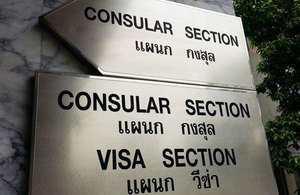Lost passports abroad cost Brits millions a year
Thousands of British nationals pay for emergency travel documents every month as last-minute passport replacements.

British Embassy Bangkok
Using your passport as a beer mat, notebook or accidentally putting it in the laundry are just some of the reasons why British travellers are spending millions of pounds each year on Emergency Travel Documents (ETDs) - issued when passports are lost, stolen or damaged whilst abroad.
In 2014/15 20,663 British passports were reported lost or stolen worldwide and British travellers received 37,890 ETDs: a 22% increase on the year before (Helping British Nationals Abroad 2014/15).
In 2015, lost and stolen passports in the South East Asia region accounted for 44 % of all ETDs issued.
The British Embassy in Bangkok issues the highest number of ETDs in South East Asia. On average that is 55 ETDs each month - nearly 700 per year. Over 70% are down to lost and stolen passports.
Stolen passports remain an issue in big cities like Bangkok, mainly due to people’s bags being stolen, distraction thefts and pick-pocketing. Here is a cartoon animation to highlight some of the reasons why ETDs are issued.
The British Embassy in Bangkok is urging people travelling to Thailand and the region to look after their passports whilst on holiday and save themselves the time, hassle and cost of buying an ETD.
Obtaining an ETD can take several days depending on the circumstances. You may need to file a police report, get new passport photos, and of course, have to travel to the Embassy. You will also likely have to replace any visas you need for your onward journey. These expenses can spiral if you need to rearrange travel plans, so make sure you take out comprehensive travel insurance. Do consult our travel advice as well.
Layla Slatter MBE, HM Consul for Thailand said:
“Our staff deal with people every day who need ETDs for a range of reasons. Some are victims of crime, but we also hear of passports being damaged carelessly, or lost while travelling.
Many of these situations could have been avoided and end up costing travellers valuable time and money. We strongly advise people to look after their passport, keep it safe and check its validity well in advance of travel. Simple steps such as locking your passport in a safe if you have access to one and carrying a photocopy with you can help prevent problems later on.
Key tips for keeping your passport safe abroad
- Value your passport and look after it carefully
- Your passport is not always safer on you – lock it in a safe if you have access to one
- Make two photocopies of your passport – leave one with friends or family and take the second with you, or store it online using a secure data storage site
- Where possible, use this photocopy as alternative ID, for example when going out at night
- Make sure your passport is valid
- For certain countries your passport must be valid for 6 months after the date you travel – check the entry requirements before you go
Further information
-
For further information, interviews or case studies please contact Notarial & Documentary Consular team on consularenquiriesbangkok@fco.gov.uk
- An Emergency Travel Document (ETD) can be issued abroad if your passport has been lost or stolen or is otherwise unavailable. Unlike your normal passport, which is valid for 10 years, an ETD is valid for a specific journey within a specified time. It can be issued quickly if you need to travel urgently at short notice when you are overseas. See our information leaflet here:
- UK Travel Advice for Thailand
Digital resources:
-
For further details see FCO publication: Helping British Nationals Abroad 2014/15
-
To help more passports survive the summer holiday season, the FCO has released a cartoon animation to highlight some of the reasons why ETDs are issued.
-
FCO consular staff have also produced a video targeted at British music fans to help tackle the problem of Brits losing passports at outdoor music festivals abroad
-
The FCO is encouraging people to sign up to its Facebook and Twitter feeds to ensure they are informed of the latest travel advice.
What can the FCO do for people who have problems when travelling abroad?
- Issue you with an emergency travel document
- Give you a list of local lawyers, interpreters, doctors or funeral directors
- Contact friends and family back home for you if necessary
- Provide information about transferring funds
- Visit you in hospital or if you have been arrested
The FCO can’t:
- Help you enter a country if you don’t have a valid passport or necessary visas
- Give you legal advice
- Get you better treatment in hospital or prison than is given to local people
- Pay any bills or give you money
- Make travel arrangements for you